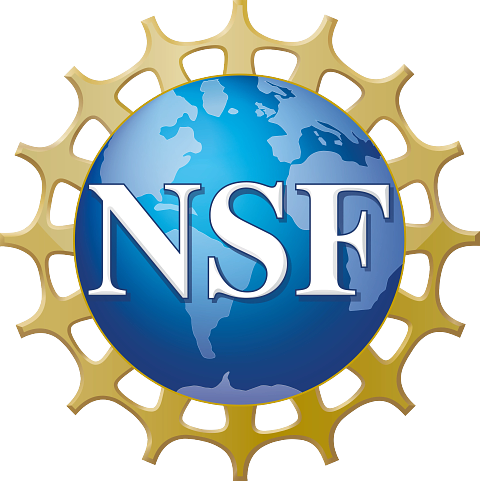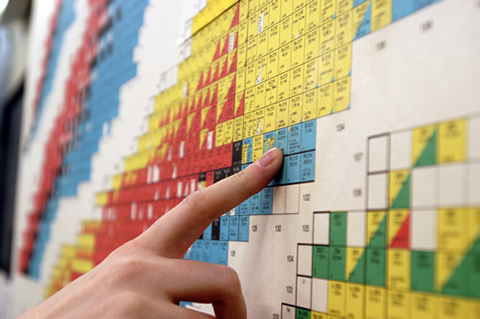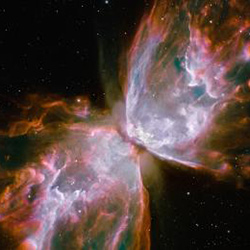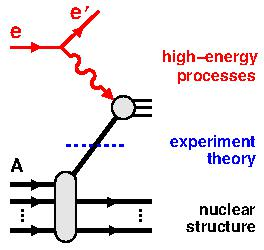School Dates:
June 18: arrival day, arrange to be at FIU by the evening
June 19-27: lecture days
Contact:
E-mail: nuclearschool25@jlab.org . In case of issues with this e-mail address, contact one of the organizers directly (see below for contacts).
Context and goal:
Nuclei are quantum systems with a rich internal structure characterized by motion, interaction, and response to external probes. The structure extends over multiple scales, from the size of the nuclear bound state (~ several fm) to the hadronic scale of nucleons and mesons (~ 1 fm) to the quark/gluon substructure governed by Quantum Chromodynamics (<< 1 fm).
The future Electron-Ion Collider (EIC) will enable a program of high-energy electron scattering experiments on light nuclei (A = 2, 3, 4...), extending the reach of earlier fixed-target scattering experiments at Jefferson Lab and other facilities. Such experiments can answer basic questions such as the chromodynamic origin of the nucleon-nucleon interactions, the presence of non-nucleonic degrees of freedom in nuclei, the effect of nuclear binding on the quarks and gluons in nuclei, and the spatial distributions of chromodynamic matter in nuclei. The results could transform our efforts to understand nuclear structure and processes from first principles.
Scattering processes on nuclei at multi-GeV energies require specific theoretical and experimental methods for measurement and analysis. Theory needs to describe the configurations in the nucleus in initial state, the impact of scattering process on the composite system, and the distribution of particles in the final state. A special feature of high-energy scattering on nuclei is that the processes involve structures at multiple energy and time/distance scales, requiring appropriate techniques. Experiments at EIC need to prepare the ion beam, possibly including polarization, and detect the nuclear fragments in the final state.
The summer school will train junior nuclear physicists in the specific theoretical and experimental methods for high-energy scattering on light nuclei, with a focus on measurements at the EIC. The goal is to enable the students to join current research efforts in this area and participate in the development of the EIC light-ion physics program.
Topics:
- High-energy scattering on nuclei: Separation of scales, high-energy process and low-energy nuclear structure, light-front methods
- Nucleon interactions: Effective Field Theory methods, renormalization group, scale dependence
- Few-body bound states: Faddeev, hypershperical, Green function Monte-Carlo methods; nucleon configurations
- Short-range nuclear structure: High-momentum components, nucleon correlations, inclusive/exclusive measurements, JLab experiments
- Nuclear partons: EMC effect, antishadowing, shadowing, connection with nuclear dynamics
- Light ions at EIC: Ion beams, running conditions, far-forward detection, spectator tagging, simulations
- Coherent and exclusive scattering: Nuclear generalized parton distributions, quark/gluon imaging of nuclei, exclusive processes
- Polarization: Spin density matrix, polarization observables, tensor polarized deuteron
- Machine learning and artificial intelligence: Applications to nuclear few-body systems, data analysis, simulations
Lecturers include:
Wim Cosyn (Florida International University)
Dave Gaskell (Jefferson Lab)
Alex Gnech (Old Dominium University)
Vadim Guzey (Jyvaskyla University)
Christopher Leon (Los Alamos National Lab)
Alessandro Lovato (Argonne National Lab)
Dien Nguyen (University of Tennessee Knoxville)
Saori Pastore (Washington University St. Louis)
Jackson Pybus (Los Alamos National Lab)
Matteo Rinaldi (Perugia University & INFN)
Misak Sargsian (Florida International University)
Zhoudunming Tu (Brookhaven National Lab)
Christian Weiss (Jefferson Lab)
Format:
The school will be held in person at Florida International University, June 18-27, 2025. Please arrange to arrive by the evening of June 18 ("arrival day"), lectures will run from June 19-27. Topics will be covered in lectures of 3-6 h per topic. Lectures will include exercises and Q&A sessions, and hands-on tutorials with simulation software. There will be extensive opportunities for informal interactions with lecturers and between students for mentoring and networking.
Online participation will be possible for students unable to travel (in-person participation is strongly encouraged for those able to travel). Lectures and materials will be made available online for asynchronous learning and continuing usage. The goal is to form a community with a common knowledge base in light-ion physics.
Target audience:
The school is aimed at graduate students and junior postdocs in theoretical or experimental nuclear physics. Students with backgrounds and interests in hadronic physics and QCD, low-energy nuclear structure, or experimental methods are equally encouraged to apply.
Application and admission:
The school is open for applications. Applications should be sent by E-mail to nuclearschool25@jlab.org. Applications should include:
- Personal statement of the applicant's academic and/or research interests and qualifications for the school (<1 page)
- Curriculum Vitae
- Names and E-mail addresses of 1-2 references attesting to the applicant's qualifications and interests. The applicant should ask the references to send their statements by E-mail to nuclearschool25@jlab.org at their own initiative. Short specific statements are sufficient and preferred; formal letters of recommendation are not needed.
Applications will be reviewed continuously, and applicants will be informed as soon as possible. Participation in the school (in-person or online) requires admission by the organizers.
Accommodation:
Accommodation is available at the Florida International University student dormitories (single rooms, shared facilities). Details here.
Financial support:
Local accommodation (FIU dorms) and meals (breakfast, lunch, coffee breaks) are supported for the participants.
Organizers:
Wim Cosyn (Florida International University) wcosyn@fiu.edu
Dien Nguyen (University of Tennessee Knoxville) dien@jlab.org
Christian Weiss (Jefferson Lab) weiss@jlab.org
Funding Acknowledgment:
The school is supported by an award from the U.S. National Science Foundation

Follow-up activities:
A study group "Light-ion physics with EIC" has been formed to continue/extend the training activities of the Summer School on a regular schedule. See the webpage for upcoming lectures, discussions and activities and archived materials.



